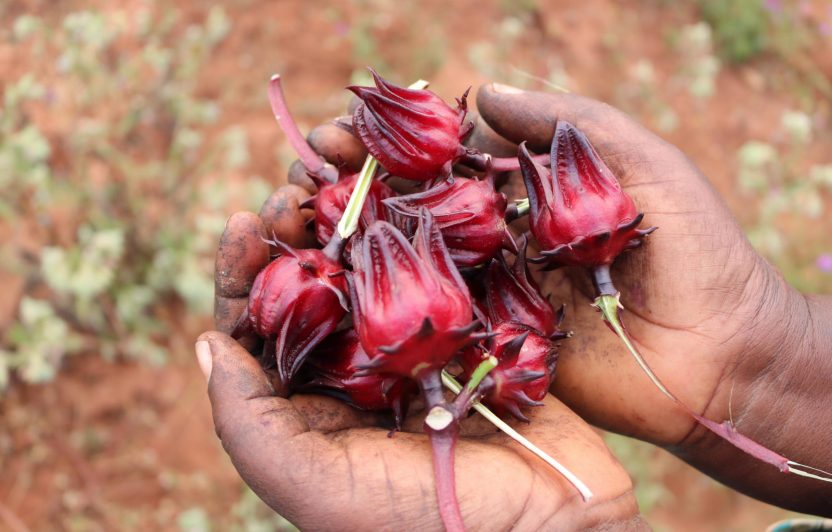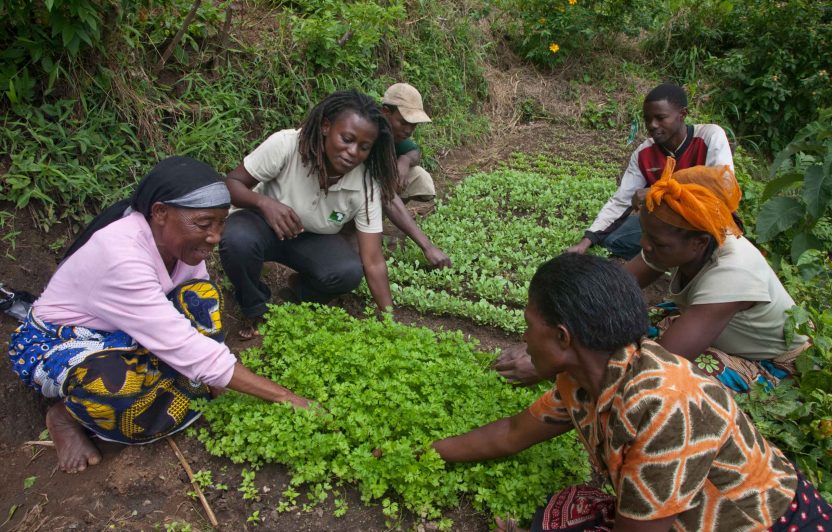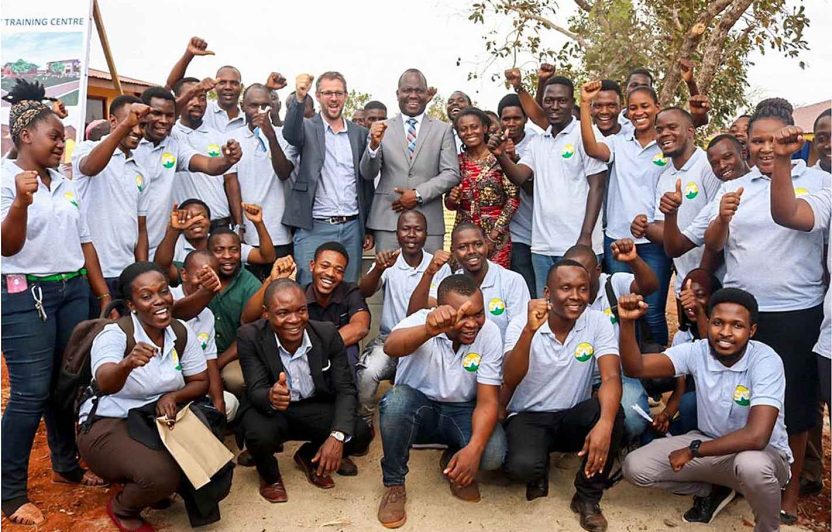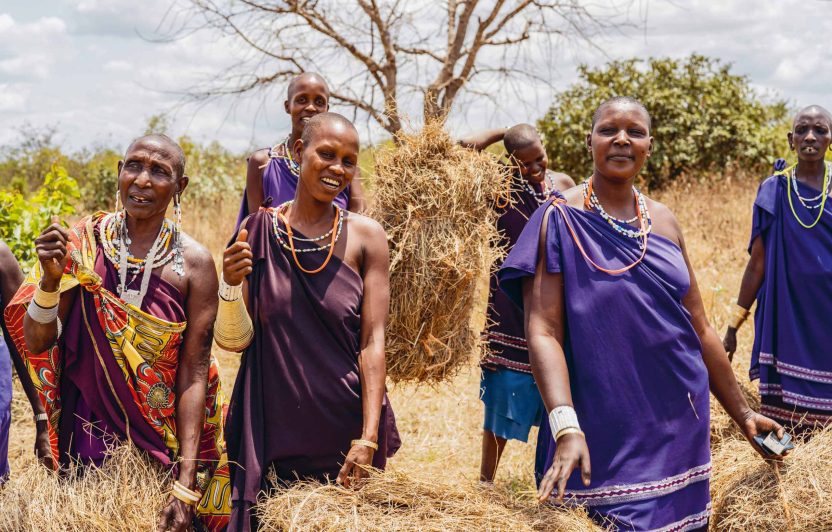The links to the interview:
- Sustainable Agriculture Tanzania (SAT)
- The ancillary social enterprise “SAT Holistic Group”
- Farmer Communication Programme by Biovision
Alexander Wostry, SAT describes itself as farmer owned. What does that mean?
Alexander Wostry: Farmer owned means that we want to involve farmers in all parts of the value chain: not only in production but also in marketing and sales. This has two major advantages. First, the women producers become more reliable partners because they are not tempted to sell their products elsewhere. Second, they feel that they are part of a group and take more responsibility for the quality of their products. We work for impact, which means that we are not focused on profit but rather on adding value to the community and creating a positive impact at the environmental level.
SAT relies on the concept of agroecology, for which knowledge plays a big role. How does SAT deal with this?
Agroecology embeds knowledge culturally and supports smallholder structures. Our approach builds links between women farmers, trainees, researchers and the government to secure and disseminate locally embedded knowledge. The community, with its experience, is our core network. It is the largest disseminator of knowledge about agroecological agriculture.
The transformation of food systems stands at Biovision’s core. To what extent can SAT contribute to change?
The agroecological approach is essential. We must recognize that. If you look at the smallholder structures in Tanzania, you can see that many agroecological methods are already being used. The task now is to recognize, improve, scientifically support and disseminate these methods. Our networks ensure the flow of information and the exchange of knowledge. This is why we also maintain a close relationship with our farmers. We now work closely with over 10,000 farmers and visit them regularly. Through the training centre co-financed by Biovision and the Farmer Communication Programme, we can make information accessible to a large group of people in a targeted manner.
Can your approach be transferred to other countries and regions?
I think our approach can be applied globally. We see what people actually need in the fields, but we also have influence at the political level because we work with the Tanzanian Ministry of Agriculture and actively exchange with them through consultations and workshops. That is how we were able to successfully change the agricultural training curriculum two years ago so that it now also includes a module on organic farming methods. I am convinced that our example will set a precedent and spread further.
What are the decisive points?
Communication, innovation and passion are central. Enthusiasm arises from the community; this is where exchange happens and curiosity is awakened. We attach great importance to intensive communication. For example, each farmer group has at least one smartphone through which information is provided daily. Or we visit them in the field or invite them to our training gardens. We want to build a system where the farmers can teach themselves and pass on knowledge to each other. If we manage to make people understand that they are participants, that is an important step.
So it’s about empowering people?
Yes. The social component in agroecology is a very important one. We want to show people their importance in the system and create a network in which information transfer flourishes, for example through teaching organic farming methods. Having a strong community to tackle challenges together and also celebrate successes – this defines agroecology best for me. We at SAT see ourselves as service providers and the women farmers as amplifiers: the farmers can pass on their knowledge and arouse curiosity in others, who can become participants themselves. This is how the system can become self sustaining and inspire others to adopt the same business model.
Farmers often fear that by converting to organic farming, they will have to accept considerable losses of yields and profits. How do you manage to convince them of agroecological methods?
The approximately 25 farmers who agreed to cooperate with us ten years ago were pioneers at the time. When the topic of organic farming comes up in the media, these farmers like to be mentioned as showcase examples and thus also enjoy a strong media presence. They have noticed how their fields’ soils and yields have improved since then, which naturally arouses other farmers’ interest. The beginning requires a lot of work, especially physical labour. But it pays off eventually: soil fertility increases and resilience grows through biodiversity. If one crop fails, you can fall back on another.
What is still missing for agroecology to become marketable?
Although countless studies emphasize positive effects of agroecological production, little research has been conducted about how to profitably connect women farmers who use these methods to the market. Naturally, it is great to let farmers share in the profits and to have a business model that benefits society and the environment. But it is only when everything works economically in a larger context that the model can grow and spread. We want to take on a pioneering role and inspire others to join this trend. We can lead the way as pioneers, but we alone cannot convert all of Tanzania to organic agriculture. For this, we need other multipliers: we have to be able to inspire companies, cooperatives and even more farmers to follow our path.

Lässt sich Ihr Ansatz auch auf andere Länder und Regionen übertragen?
Ich denke, unser Ansatz lässt sich global anwenden. Wir sehen, was die Menschen auf den Feldern tatsächlich benötigen, aber wir haben auch Einfluss auf politischer Ebene, da wir mit dem tansanischen Landwirtschaftsministerium zusammenarbeiten und durch Beratungen und Workshops in regem Austausch mit ihnen stehen. So konnten wir vor zwei Jahren erfolgreich den Lehrplan der landwirtschaftlichen Ausbildung ändern, sodass dieser nun auch ein Modul zu biologischen Anbauweisen beinhaltet. Ich bin überzeugt, dass unser Beispiel Schule machen und sich weiterverbreiten wird.
Welches sind die entscheidenden Punkte?
Kommunikation, Innovation sowie Leidenschaft sind zentral. Aus der Gemeinschaft entsteht die Begeisterung, hier geschieht der Austausch und wird die Neugier geweckt. Wir legen viel Wert auf eine intensive Kommunikation. So haben die Bauerngruppen zum Beispiel mindestens ein Smartphone, über welches ihnen täglich Informationen bereitgestellt werden. Oder wir besuchen sie im Feld oder laden sie in unsere Schulungsgärten ein. Wir wollen ein System aufbauen, wo sich die Bäuerinnen und Bauern selber unterrichten können und das Wissen weitertragen. Zu schaffen, den Menschen zu vermitteln, dass sie Teilhaber sind, ist ein wichtiger Schritt.
Es geht darum, Menschen zu befähigen?
Ja. Die soziale Komponente in der Agrarökologie ist eine ganz wichtige. Wir möchten den Menschen ihre Bedeutung im System aufzeigen und ein Netzwerk schaffen, in dem der Informationsfluss gedeihen kann, zum Beispiel beim Vermitteln ökologischer Anbaumethoden. Eine starke Gemeinschaft zu haben, in der man gemeinsam Herausforderungen angeht und auch Erfolge feiert – dies definiert für mich Agrarökologie am besten. Wir sehen uns bei SAT als Dienstleister und die Bäuerinnen als Verstärker: Sie können ihr Wissen weitertragen und die Neugier in andere wecken – und anstiften, das gleiche Geschäftsmodell zu ergreifen.
Oft befürchten Bauern, dass sie durch die Umstellung auf ökologischen Landbau erhebliche Ertrags- und Gewinneinbussen in Kauf nehmen müssen. Wie schafft ihr es, sie von agrarökologischen Methoden zu überzeugen?
Die rund 25 Bauern, die sich vor zehn Jahren zu einer Zusammenarbeit mit uns bereit erklärt haben, waren damals Pioniere. Wenn es in den Medien um das Thema biologische Landwirtschaft geht, werden diese Bauern gerne als Vorzeigebeispiele genannt und geniessen dadurch auch eine starke Medienpräsenz. Sie haben festgestellt, dass sich seither der Boden und der Ertrag ihrer Felder verbessert hat, was natürlich das Interesse anderer Bauern weckt. Am Anfang ist es viel Arbeit, vor allem körperlich. Aber die macht sich irgendwann bezahlt: Die Fruchtbarkeit des Bodens wird gesteigert und durch die Artenvielfalt wächst die Resilienz. Fällt einmal eine Ernte weg, kann man auf eine andere zurückgreifen.
Was fehlt noch, um Agrarökologie markttauglich zu machen?
Es liegen zwar unzählige Studien vor, welche ihre positiven Auswirkungen betonen, aber wie man agrarökologisch produzierende Bäuerinnen gewinnbringend an den Markt anbindet, wurde noch kaum beforscht. Natürlich ist es toll, die Bauern am Profit teilhaben zu lassen und ein Geschäftsmodell zu haben, aus welchem die Gesellschaft wie auch die Umwelt einen Nutzen ziehen können. Aber erst, wenn das Ganze auch wirtschaftlich in einem grösseren Kontext aufgeht, kann es zu einer Geschichte werden, die wächst und sich verbreitet. Wir wollen diese Vorreiterrolle einnehmen und andere dazu inspirieren, sich von diesem Trend mitreissen zu lassen. Wir können als Pioniere vorangehen, aber wir können nicht alleine ganz Tansania auf biologisch umstellen. Dazu braucht es weitere Multiplikatoren: Wir müssen es schaffen, Firmen, Kooperativen und noch mehr Bäuerinnen und Bauern zu inspirieren, unseren Weg einzuschlagen.





